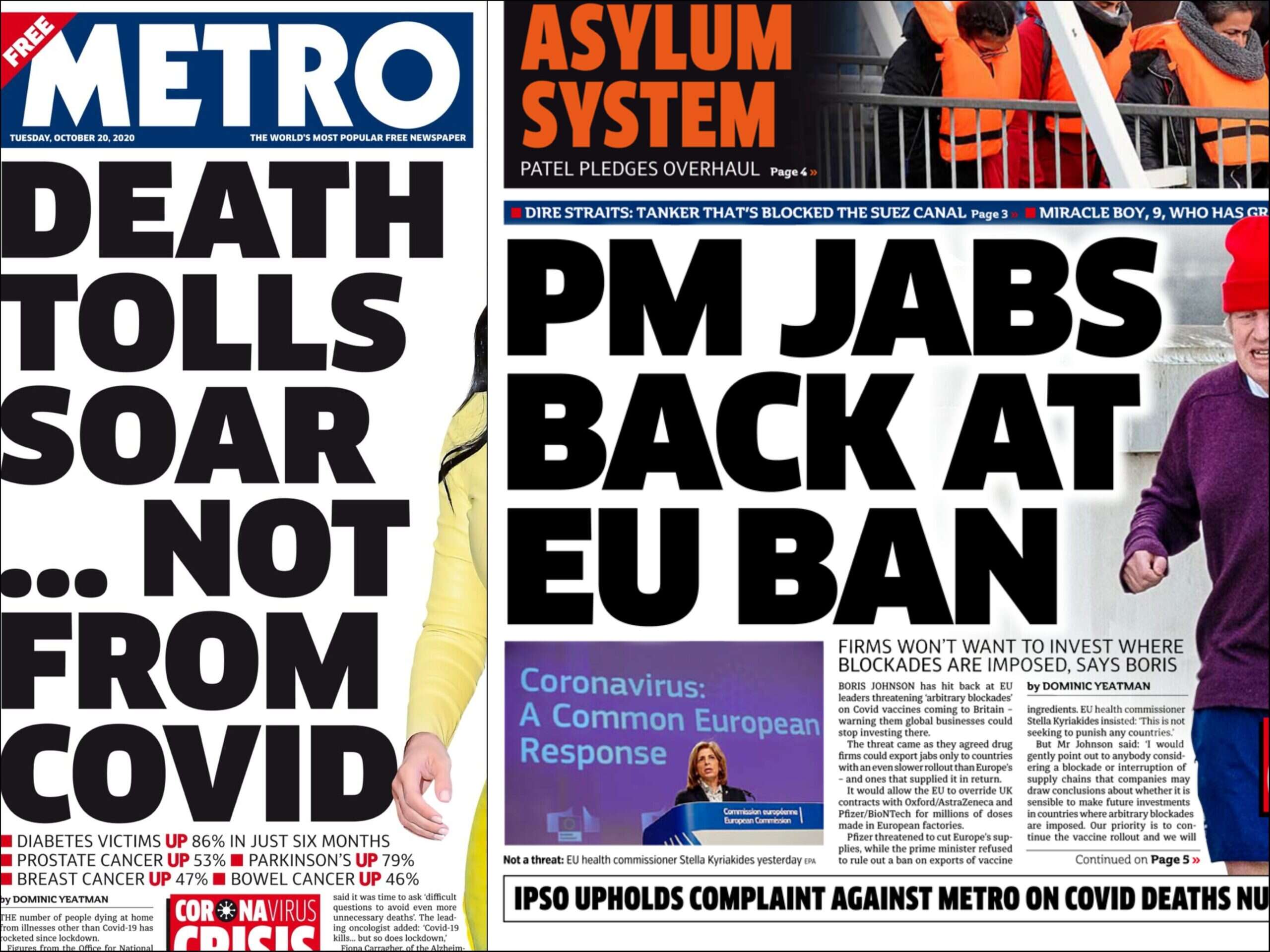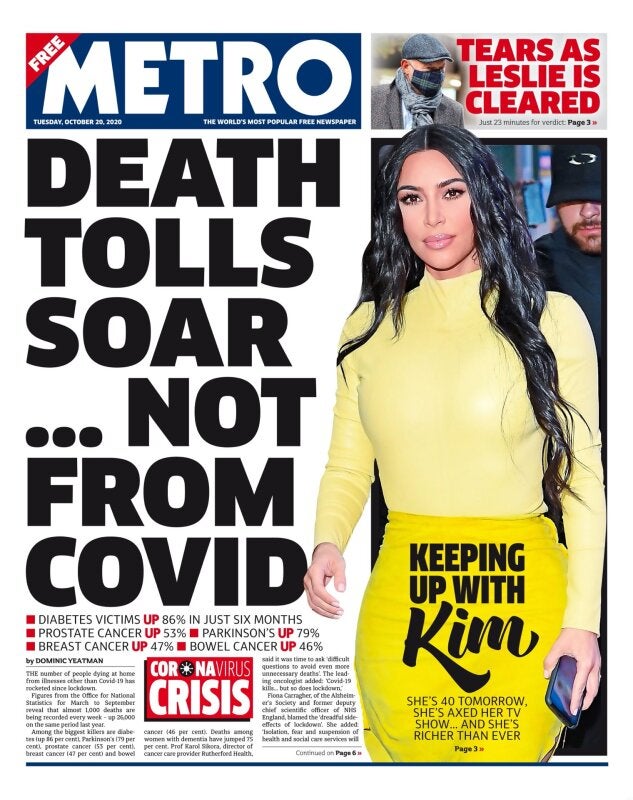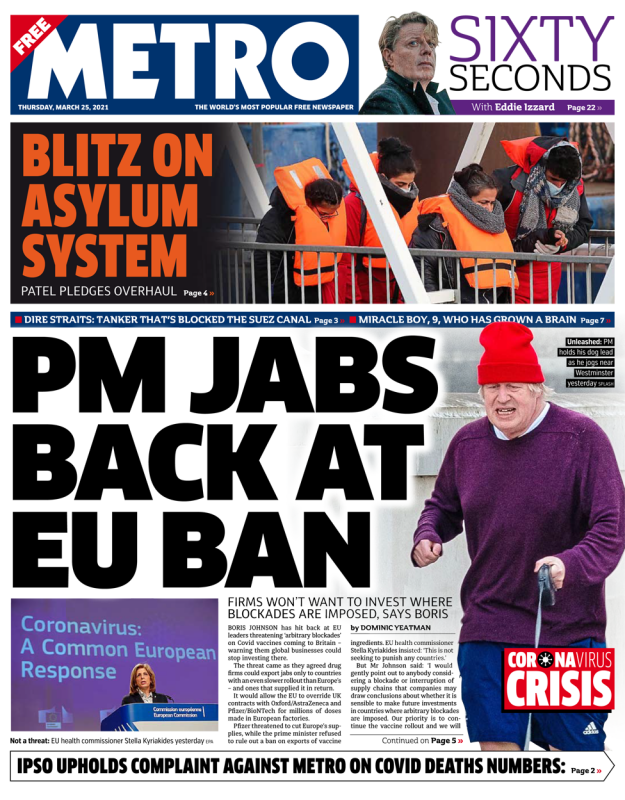
IPSO has issued a rare order to Metro to flag a “serious” breach of the Editors’ Code on its front page, after it wrongly claimed deaths from illnesses other than Covid-19 had “rocketed” during lockdown.
IPSO said Metro’s splash made “eye-catching categorical claims without qualification of sufficient prominence and gave the highly misleading impression that deaths had soared”.
The regulator added: “The article was misleading on a matter of great significance during a global public health emergency.”
The headline, published on 20 October, read: “Death tolls soar… not from Covid” followed by a standfirst listing the increases in deaths from other diseases.
“Diabetes victims up 86% in just six months; prostate cancer up 53%, Parkinson’s up 79%, breast cancer up 47%, bowel cancer up 46%,” it said.

Metro “Death tolls soar… not from Covid” front page on 20 October 2020 that broke IPSO rules
The opening paragraph claimed “the number of people dying at home from illnesses other than Covid-19 has rocketed since lockdown” and a comment quoted on the front page said: “Covid-19 kills… but so does lockdown.”
IPSO said altogether this gave the “strong impression that overall deaths had increased dramatically” although in fact deaths had in effect been redistributed from hospitals to homes, with hospital deaths falling sharply.
A comment from a statistician included in the story, where it had continued on page six, said: “Most of these deaths would normally have occurred in hospital, and people have either been reluctant to go, discouraged from attending or the services have been disrupted.”
But IPSO said this was “not sufficient to correct the misimpression created by the headline and standfirst”.
It said the paper’s failure to take care not to publish misleading information was a serious breach of Clause 1 (accuracy) of the Editors’ Code of Practice “given the nature of the subject matter and the potential for concern caused to readers”.
The regulator has said reporting on Covid-19 is “not always easy” and is publishing a list of case studies, mostly relating to issues of accuracy, to help editors abide by the Editors’ Code of Practice.
The Metro story also pointed to Office for National Statistics figures for March to September 2020 to show almost 1,000 deaths were being recorded every week, an increase of 26,000 year-on-year.
However, this was also inaccurate as the increase was actually against the five-year average.
IPSO said: “This was significant. It misrepresented the number of deaths at home during a specific time period, information that was publicly available and accessible at the time of publication.”
Metro had offered to publish a correction but it focused solely on the latter statistical point and, IPSO said, “did not acknowledge the significantly misleading impression given by the headline and the article as a whole, or adequately correct it”.
The newspaper argued that a front page correction would be inappropriate due to IPSO’s requirement for due prominence rather than equal prominence, and what it described as the “relative insignificance of the error”.
But IPSO said: “Given the prominence of the original article, and the nature of the breach, a reference to the upheld ruling should be published on the front page of newspaper.”

Metro front page on 25 March 2020 with front page IPSO statement
Metro published the statement at the bottom of its front page on Thursday, stating: “IPSO upholds complaint against Metro on Covid deaths numbers.”
The adjudication published on Metro’s page two said: “In IPSO’s view, the need for reliable, accurate journalism during the Covid-19 pandemic is paramount. The accurate reporting and presentation of statistics, particularly those relating to deaths, is vital to keeping the public well-informed.
“In this instance, it found the article made eye-catching categorical claims without qualification of sufficient prominence and gave the highly misleading impression that deaths had soared.”
IPSO front page ruling requirements
IPSO does not frequently use its powers to force a front page statement, saying they are “generally reserved for the most serious cases”.
The regulator is usually reluctant to intrude upon a newspaper’s right to editorial expression within the limited space of its front page, which it acknowledges is particularly commercially valuable for reaching potential new readers.
It did require two in under a week in July 2018:
- Daily Mail, following major inaccuracies in a splash headlined “Another human rights fiasco!” and sub-headlined “Iraqi ‘caught red-handed with bomb’ wins £33,000 – because our soldiers kept him in custody for too long’”;
- Daily Mirror, after it distorted comments by former Health Secretary Jeremy Hunt about the NHS winter crisis in order to personally criticise him.
And previous front page requirements have included:
- The Times, after wrongly claiming a Labour tax plan would directly impose additional taxes worth more than £1,000 on “every working family”;
- The Sun, after Buckingham Palace complained over the front page headline “Queen backs Brexit”;
- Daily Express, after claiming “98% say no to EU deal” without making clear this referred only to a self-selecting poll of the paper’s readers.
In April 2018 The Times chose to publish a front page correction after IPSO said aspects of its reporting of the case of a Christian girl placed with Muslim foster carers in east London had “distorted” the facts. However, the regulator had only ordered it to publish the correction on page six or earlier.
Email pged@pressgazette.co.uk to point out mistakes, provide story tips or send in a letter for publication on our "Letters Page" blog
